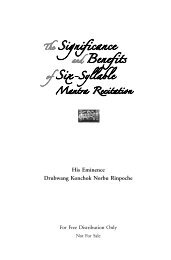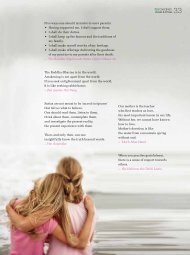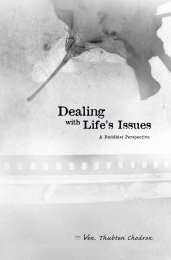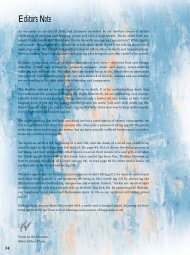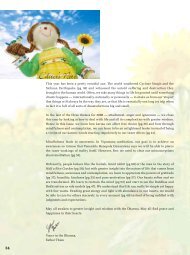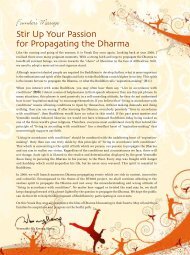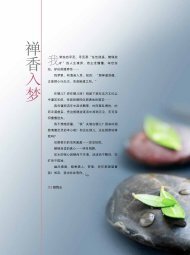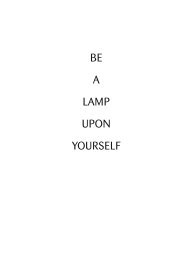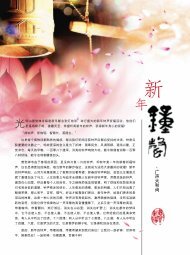Editor's Note - Dharma Resources - Kong Meng San Phor Kark See ...
Editor's Note - Dharma Resources - Kong Meng San Phor Kark See ...
Editor's Note - Dharma Resources - Kong Meng San Phor Kark See ...
Create successful ePaper yourself
Turn your PDF publications into a flip-book with our unique Google optimized e-Paper software.
the wrong view, I’d be dead by now! The right abiding<br />
place for monks, the place of coolness, is just right<br />
view itself. We shouldn’t look for anything else.<br />
So even though you may be unhappy it doesn’t matter,<br />
that unhappiness is uncertain. Is that unhappiness<br />
your ‘self’ Is there any substance to it Is it real<br />
I don’t see it as being real at all. Unhappiness is<br />
merely a flash of feeling which appears and then is<br />
gone. Happiness is the same. Is there a consistency to<br />
happiness Is it truly an entity It’s simply a feeling<br />
that flashes suddenly and is gone. There! It’s born and<br />
then it dies. Love just flashes up for a moment and<br />
then disappears. Where is the consistency in love, or<br />
hate, or resentment In truth there is no substantial<br />
entity there, they are merely impressions which<br />
flare up in the mind and then die. They deceive us<br />
constantly, we find no certainty anywhere.<br />
Just as the Buddha said, when unhappiness arises<br />
it stays for a while, then disappears.<br />
When unhappiness disappears,<br />
happiness arises and lingers for a<br />
while and then dies. When happiness<br />
disappears, unhappiness arises<br />
again...on and on like this.<br />
If we cut a log of wood and throw it into the river,<br />
and that log doesn’t sink or rot, or run aground on<br />
either of the banks of the river, that log will definitely<br />
reach the sea. Our practice is comparable to this. If<br />
you practise according to the path laid down by the<br />
Buddha, following it straightly, you will transcend<br />
two things. What two things Just those two<br />
extremes that the Buddha said were not the path<br />
of a true meditator — indulgence in pleasure and<br />
indulgence in pain. These are the two banks of the<br />
river. One of the banks of that river is hate, the other<br />
is love. Or you can say that one bank is happiness,<br />
the other unhappiness. The ‘log’ is this mind. As it<br />
‘flows down the river’ it will experience happiness<br />
and unhappiness. If the mind doesn’t cling to that<br />
happiness or unhappiness it will reach the ‘ocean’<br />
of Nibbana. You should see that there is nothing<br />
other than happiness and unhappiness arising and<br />
disappearing. If you don’t ‘run aground’ on these<br />
things then you are on the path of a true meditator.<br />
In the end we can say only<br />
this — apart from the birth,<br />
the life and the death of<br />
suffering, there is nothing.<br />
There is just this. But we<br />
who are ignorant run and<br />
grab it constantly. We never<br />
see the truth of it, that<br />
there’s simply this continual<br />
change. If we understand<br />
this then we don’t need to<br />
think very much, but we<br />
have much wisdom. If we don’t know<br />
it, then we will have more thinking<br />
than wisdom — and maybe no wisdom<br />
at all!<br />
It’s not until we truly see the harmful results of our<br />
actions that we can give them up. Likewise, it’s not<br />
until we see the real benefits of practice that we can<br />
follow it, and begin working to make the mind ‘good’.<br />
This is the teaching of the Buddha. Happiness,<br />
unhappiness, love and hate are simply established<br />
in nature according to the constant law of nature.<br />
The wise person doesn’t follow or encourage them,<br />
he doesn’t cling to them. This is the mind which<br />
lets go of indulgence in pleasure and indulgence<br />
in pain. It is the right practice. Just as that log of<br />
wood will eventually flow to the sea, so will the<br />
mind which doesn’t attach to these two extremes<br />
inevitably attain peace.<br />
This article is extracted from The Teachings of Ajahn<br />
Chah (www.ajahnchah.org). Copyright The <strong>San</strong>gha,<br />
Wat Nong Pah Pong.<br />
Issue 13 • January – April 2009 49<br />
Feature<br />
awaken





